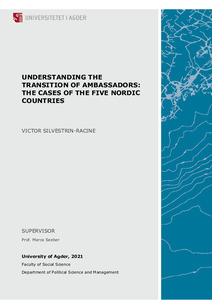Understanding the transition of ambassadors : The cases of the five nordic countries
Silvestrin-Racine, Victor (2021)
Silvestrin-Racine, Victor
2021
Nordic Master's Programme in Innovative Governance and Public Management
Johtamisen ja talouden tiedekunta - Faculty of Management and Business
This publication is copyrighted. You may download, display and print it for Your own personal use. Commercial use is prohibited.
Hyväksymispäivämäärä
2021-06-22
Julkaisun pysyvä osoite on
https://urn.fi/URN:NBN:fi:tuni-202105315591
https://urn.fi/URN:NBN:fi:tuni-202105315591
Tiivistelmä
The transition process between one leader to another has profound implications for an organizational well functioning and survival and must be therefore carefully managed. The transition can allow for a smooth start of a leader’s tenure or lead to potentially difficult situations. Few academic studies are looking at the transition of public managers and none looking at the Ministry of Foreign Affairs (MFA), namely, at the transition between ambassadors.
A key function of the MFA, which is implemented primarily through its embassies, is to establish and preserve good relationships with other countries -their societal and economic actors, as well as helping nationals located abroad. The MFA relies to a considerable extent on the ambassadors to lead and manage the embassies. Ambassadors’ transition occurs on a regular base, every two to four years, and they are therefore faced rather frequently with the challenge of acclimating themselves quickly at their new location. Quite surprisingly, however, scholarly research has not explored specifically on this transition process so far.
Therefore, the goal of this thesis is to examine the transitions of ambassadors of the five Nordic European countries and the forces that shape them, by focusing in particular on the most challenging aspect of transferring context specific knowledge and context specific networks. The study does so by describing the role and responsibilities of the Ministry of Foreign Affairs, the host embassy, and the ambassador, and analyzing the elements shaping the transition process through the lenses of new-institutional and bounded-rational perspectives in organizational theory. From interviews with current ambassadors, HR directors at the Ministries of Foreign Affairs and personnel of embassies, this is the first study to investigate this topic, which lies at the junction of the studies on diplomacy and organizational research.
The results show that Iceland and Sweden have a very formal transition process, whereas Norway and Denmark rely on a mix between formal steps and personal initiatives. The transition of Finnish ambassadors is solely based on their experience and initiatives. The results show that the transition process of ambassadors is mostly consistent with a bounded rational perspective on organizations.
A key function of the MFA, which is implemented primarily through its embassies, is to establish and preserve good relationships with other countries -their societal and economic actors, as well as helping nationals located abroad. The MFA relies to a considerable extent on the ambassadors to lead and manage the embassies. Ambassadors’ transition occurs on a regular base, every two to four years, and they are therefore faced rather frequently with the challenge of acclimating themselves quickly at their new location. Quite surprisingly, however, scholarly research has not explored specifically on this transition process so far.
Therefore, the goal of this thesis is to examine the transitions of ambassadors of the five Nordic European countries and the forces that shape them, by focusing in particular on the most challenging aspect of transferring context specific knowledge and context specific networks. The study does so by describing the role and responsibilities of the Ministry of Foreign Affairs, the host embassy, and the ambassador, and analyzing the elements shaping the transition process through the lenses of new-institutional and bounded-rational perspectives in organizational theory. From interviews with current ambassadors, HR directors at the Ministries of Foreign Affairs and personnel of embassies, this is the first study to investigate this topic, which lies at the junction of the studies on diplomacy and organizational research.
The results show that Iceland and Sweden have a very formal transition process, whereas Norway and Denmark rely on a mix between formal steps and personal initiatives. The transition of Finnish ambassadors is solely based on their experience and initiatives. The results show that the transition process of ambassadors is mostly consistent with a bounded rational perspective on organizations.
